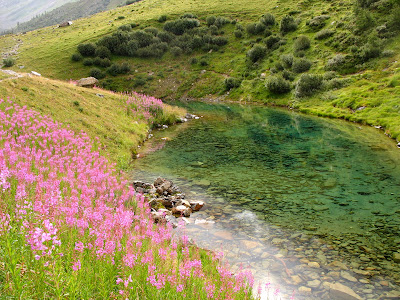Environmental History & History of Science: The New Synthesis?
 |
| Alpine lake with wildflowers in Switzerland, a natural environment manicured by grazing ungulates. |
Yesterday, I had the pleasure to attend the 3rd Northeast Environmental History Conference at Yale. The theme this year was "Two Kingdoms: New Perspectives on Flora and Fauna in Environmental History." And a few weeks prior, I was in Madison for the American Society for Environmental History Conference, where the theme was "From the Local to the Global."
What struck me at both occasions was the number of Historians of Science and Technology in attendance. This was my first time at either event, and I was glad to meet many old friends I had not expected to see before next year's History of Science Society Meeting in San Diego. But beyond this, I also heard a large number of presentations by people I've never met before, people who primarily self-identify as Environmental Historians, that could have just as well been presented at HSS or SHOT.
What's going on here? Are the two field converging on one another?
In at least two ways, I think that they are. And, so far as I'm concerned, the development is a welcome one.
In a mundane sense, Historians of Science have become increasingly interested in biological fields of study such as ecology, evolution, and behavior that used to be eclipsed by the physical sciences. So on a purely thematic level, there is increasingly commonality with Environmental History.
But there is also a deeper and ultimately more interesting sense in which the two fields are in dialogue with one another. My sense is that Environmental Historians have become increasingly aware that one cannot simply take the natural world as a given. Nature is now routinely interrogated as category of historical analysis. (Of course, this is not entirely new. People like William Cronon who are on the vanguard of the discipline have been doing it for a long time. But what used to be a fairly radical position seems to have become more or less mainstream.) In so doing, environmental history has found much inspiration from historians of science, scholars who have sought to embed our knowledge and experience of the natural world within narratives of social and cultural change for several decades.
At the same time, Historians of Science have much to learn from Environmental History. While it is certainly true that nature should be historicized alongside of everything else, this does not mean everything is cultural. Although plants and animals--to take up the theme of yesterday's conference at Yale--do not exist independently of human culture, they also exhibit a certain degree of resilience and push back against our efforts at control. There is a quote in David Blackbourn's most recent book, a fairly longue durée history of German efforts to divert rivers and streams, largely for the purposes of land reclamation, of which I'm quite fond:
"when I read yet another book or article about an 'imagined landscape,' it is sometimes tempting to complain, like Gertrude Stein, that 'there is no there there.' And I want to ask: are all topographies in the mind, is every river nothing more than a flowing symbol?"
What makes Blackbourn's Conquest of Nature such an intriguing book is not that he simply denies the impact of humans upon their landscape. Nor does he deny that our imaginations matter. Rather, he looks at how the social, cultural, and political imaginary of Germans exerted a material impact on their landscape. Over the centuries, Germans sought, and to some extent succeeded, in imposing their vision onto the natural world. They diverted streams and rivers, drained swamps, and executed ambitious hydrological projects. But the landscape was not merely inert matter, sitting there for people to shape after their own image. Rather, he narrates a complex and messy dialectical process in which nature and culture interact to the point that it is hard to say where one ends and the other begins.
Historians of science have been moving in that direction, but I think there is much that remains to be learned from the best and most sophisticated work being done by Environmental Historians today. The title of this post is meant to be tongue in cheek, harkening back to E.O. Wilson's controversial 1976 publication of Sociobilogy: The New Synthesis. Still, the conversations we've been having about the material construction of scientific evidence (especially here, as well as here and here) might point to one way in which a synthesis of Hist. Sci. and Environmental History that would benefit both sides might be achieved.


